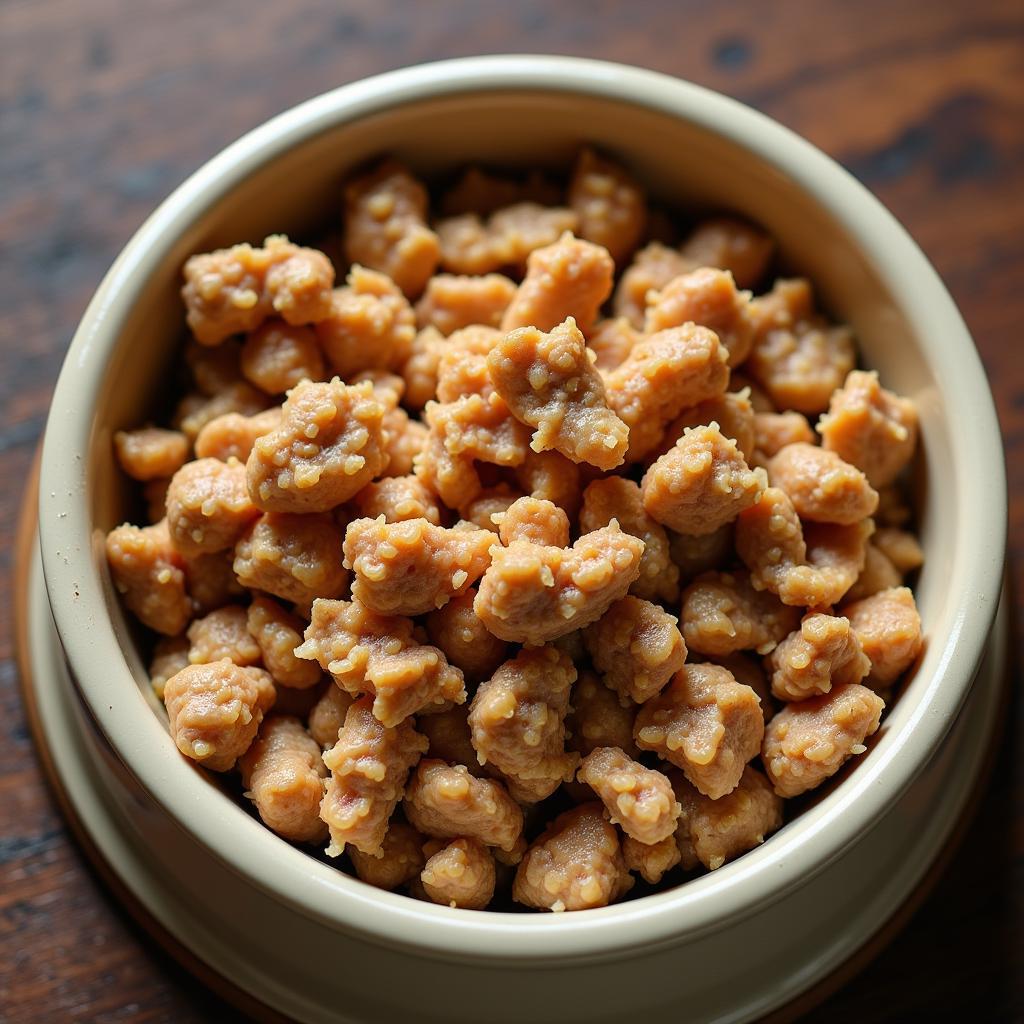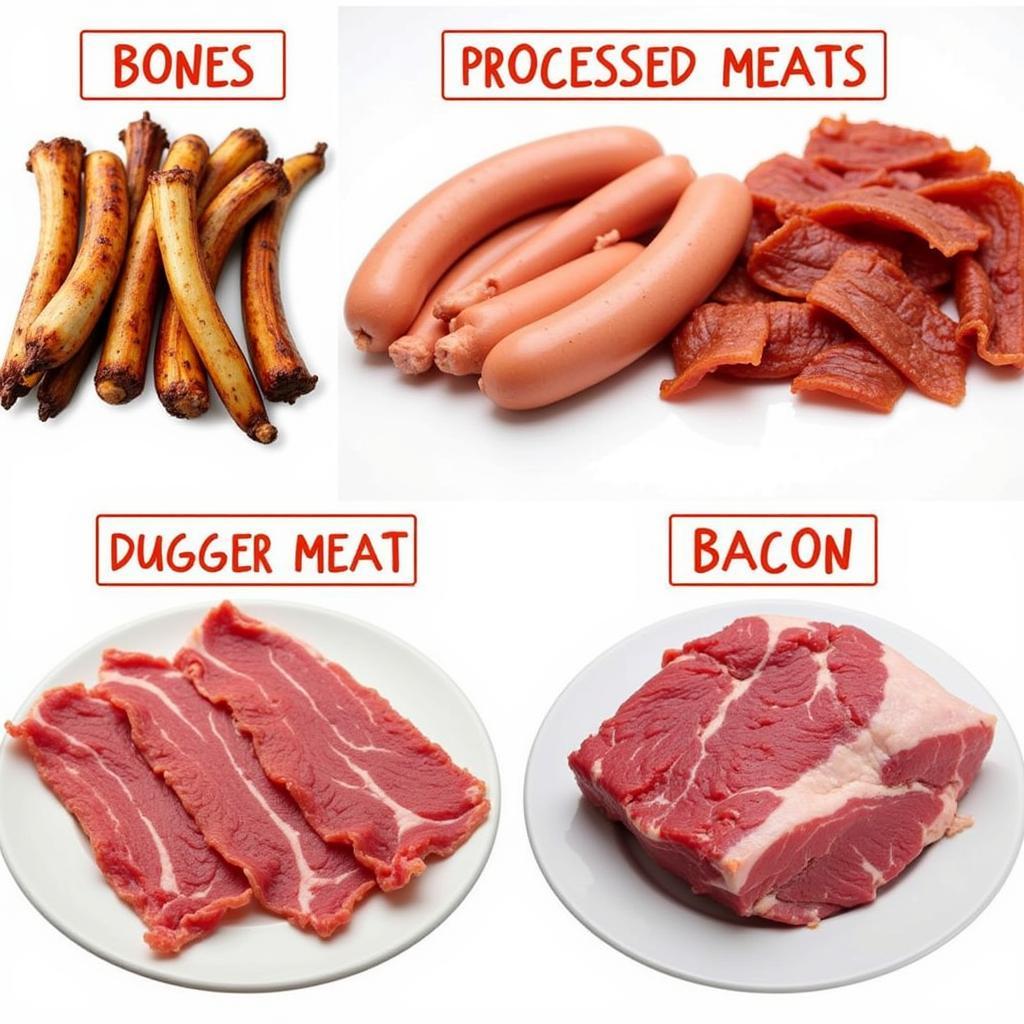When it comes to our furry companions, providing them with a nutritious and balanced diet is crucial for their overall health and well-being. While commercially prepared dog food is readily available, many dog owners are opting for homemade meals to have greater control over the ingredients their dogs consume.
One of the most important aspects of formulating a balanced homemade dog food diet is selecting the right type and quality of meat. But with so many options available, it can be overwhelming to determine the best Meat For Dog Food.
This comprehensive guide will explore the world of meat for dog food, providing valuable insights to help you make informed decisions that will keep your canine companion happy, healthy, and thriving.
Understanding the Importance of Meat in a Dog’s Diet
Dogs are carnivores, meaning their bodies are designed to thrive on a diet primarily composed of meat. While dogs can digest and utilize some plant-based foods, meat provides essential nutrients that are crucial for their overall health. Here’s why meat is non-negotiable in a dog’s diet:
-
Protein Powerhouse: Meat is an excellent source of high-quality protein, which is essential for building and repairing tissues, producing enzymes and hormones, and supporting a healthy immune system.
-
Essential Amino Acids: Meat provides all ten essential amino acids that dogs cannot produce on their own and must obtain from their diet.
-
Vitamins and Minerals: Meat is a rich source of essential vitamins and minerals, including vitamin B12, iron, zinc, and selenium, which play vital roles in various bodily functions.
 Types of Meat for Dogs
Types of Meat for Dogs
Exploring the Best Meat for Dog Food
When choosing meat for your dog’s food, it’s important to select high-quality, human-grade options. Here are some of the best meat choices:
1. Chicken
Chicken is a popular choice for dog food due to its affordability, wide availability, and lean protein content. It’s also a good source of essential fatty acids, vitamins, and minerals.
2. Beef
Beef is another excellent source of protein, iron, and zinc. When choosing beef, opt for lean cuts and avoid excessive fat, as too much fat can lead to digestive issues.
3. Turkey
Turkey is a lean and highly digestible protein source that is also rich in niacin, a B vitamin crucial for energy metabolism.
 Lean Meat Choices for Dogs
Lean Meat Choices for Dogs
4. Fish
Fish, such as salmon, tuna, and herring, are excellent sources of omega-3 fatty acids, which promote healthy skin, coat, and cognitive function. However, it’s important to choose fish that is low in mercury.
5. Lamb
Lamb is a highly digestible protein source that is rich in iron and vitamin B12. It’s important to note that some dogs may be allergic to lamb.
Meat to Avoid Feeding Your Dog
While many types of meat can be beneficial for dogs, some should be avoided due to potential health risks:
-
Cooked Bones: Cooked bones can splinter and cause serious damage to a dog’s digestive tract.
-
Processed Meats: Processed meats, such as bacon, sausage, and hot dogs, are often high in salt, fat, and artificial additives that can be harmful to dogs.
-
Raw Meat: While some dog owners choose to feed a raw food diet, it’s essential to understand the risks associated with raw meat, such as bacterial contamination.
 Foods to Avoid Feeding Dogs
Foods to Avoid Feeding Dogs
Tips for Preparing Meat for Your Dog’s Food
- Cook Thoroughly: Always cook meat thoroughly to kill any harmful bacteria.
- Remove Bones: Ensure all bones are removed before feeding meat to your dog.
- Cut into Small Pieces: Cut meat into small, bite-sized pieces to prevent choking hazards.
Lysine and Arginine in Meat for Dogs
Two essential amino acids to consider when selecting meat for your dog are lysine and arginine. Lysine plays a vital role in growth, bone health, and immune function, while arginine is crucial for hormone production, wound healing, and blood vessel dilation. The ratio of lysine to arginine in a dog’s diet is important for optimal health.
You can find more information about the lysine-arginine ratio in various foods in our comprehensive lysine arginine ratio food chart.
Frequently Asked Questions About Meat for Dog Food
1. Can I feed my dog raw meat?
While some dog owners choose to feed a raw food diet, it’s important to note the risks associated with raw meat, such as bacterial contamination. If you’re considering a raw food diet for your dog, it’s crucial to consult with a veterinarian to ensure it’s appropriate for your dog’s individual needs and to receive guidance on safe handling practices.
2. How much meat should I feed my dog?
The amount of meat your dog needs will vary depending on their age, breed, size, activity level, and overall health. It’s best to consult with your veterinarian to determine the appropriate amount of meat for your dog’s individual needs.
3. Can I give my dog bones?
Raw bones can be a good source of nutrients for dogs. However, it’s essential to avoid cooked bones, as they can splinter and cause serious internal damage. Always supervise your dog when they are chewing on bones.
4. What should I do if my dog has a food allergy?
If your dog shows signs of a food allergy, such as digestive upset, skin irritation, or hair loss, it’s essential to consult with your veterinarian. They can help determine if your dog has a food allergy and recommend an appropriate diet.
5. Is it okay to feed my dog table scraps?
While it’s tempting to share your food with your furry friend, it’s generally best to avoid feeding them table scraps. Many human foods can be toxic to dogs or upset their stomachs.
Conclusion
Choosing the right meat for dog food is crucial for providing your furry companion with the nutrients they need to thrive. By understanding the importance of meat in a dog’s diet and selecting high-quality, human-grade options, you can ensure that your dog receives the best possible nutrition.
If you have any concerns about your dog’s diet or need help creating a balanced homemade meal plan, always consult with your veterinarian. They can provide personalized recommendations based on your dog’s individual needs and health status. Remember, a healthy and happy dog starts with a balanced diet.
Need further assistance? Don’t hesitate to reach out to us at Phone Number: 02437655121, Email: minacones@gmail.com. You can also visit us at our address: 3PGH+8R9, ĐT70A, thôn Trung, Bắc Từ Liêm, Hà Nội, Việt Nam. Our dedicated customer support team is available 24/7 to address your queries.
For more insightful articles on dog health and nutrition, explore our website. We have a wealth of information to help you provide the best care for your furry companion. For instance, you can learn about the best food for shih tzu with skin allergies in our detailed guide.